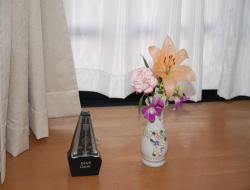Are you having trouble improving your piano playing skills or reading msical notes?

Solfeggio is a music education method used to teach pitch and the ability
to read music for playing the piano or singing.
Students will have difficulty improving their piano playing skills if they
lack musical rhythm, cannot recognize pitch, and/or are unable to read
notes smoothly. Those who cannot recognize pitch have special difficulty
playing musical notes and mastering music quickly.
If students do not learn these basic skills early in their piano education,
they may eventually become stuck, discouraged, and more likely to give
up on the piano altogether.
Since most students are not able to gain these skills naturally during
their normal piano lessons. They must be learned separately.
Fortunately, I am able to give special intensive training to students needing
to improve these essential skills.
I develop an original training menu for each student depending on his/her
abilities. My students will see substantial improvement in 1-3 years. Most
children will be able to recognize pitch in about a year.
Although it is best to get the pitch, ear and rhythm training when the
student is young and just beginning to learn the piano, I gave the solfeggio
lessons to a junior high school student, the oldest student to take these
lessons in this school. After a year, she was able to recognize pitch almost
perfectly and her ability to read music was much improved. I believe that
even adult students can profit greatly from solfeggio lessons if they are
willing to learn and put forth the effort.
As an additional advantage, those who sing off key can also receive pitch
training in this school because I am experienced in giving voice lessons.
If you want to excel at Karaoke, this course will help you, too!
Absolute Pitch and Relative Pitch

Absolute pitch, widely referred to as perfect pitch, is the ability to
identify notes without any point of reference. In other words, it is the
ability to identify or re-create a given musical note without the benefit
of a reference tone. For example, if you can play TV’s commercial song
on the piano just by hearing it from TV, there is no doubt that you have
absolute pitch.
As for absolute pitch, some people naturally possess this ability from
birth while others gain it through ear training. This ability should be
developed very early in life from the ages of 3 to 6 years old. Unfortunately,
it is too late to develop it after 6 years old when ears are fully grown.
However, you can gain relative pitch through training no matter how old
you are. So, I recommend you take this training when you start taking piano
lessons. Relative pitch is the ability to identify the pitch of notes relative
to other notes you’ve heard. If you at least have this ability, you will
have no trouble learning the piano.
Of course, it is better to have absolute pitch, but relative pitch is all
that is required to develop excellent musical skills. In fact, there are
famous musicians who do not possess absolute pitch, yet give great performances,
because they have developed relative pitch.
